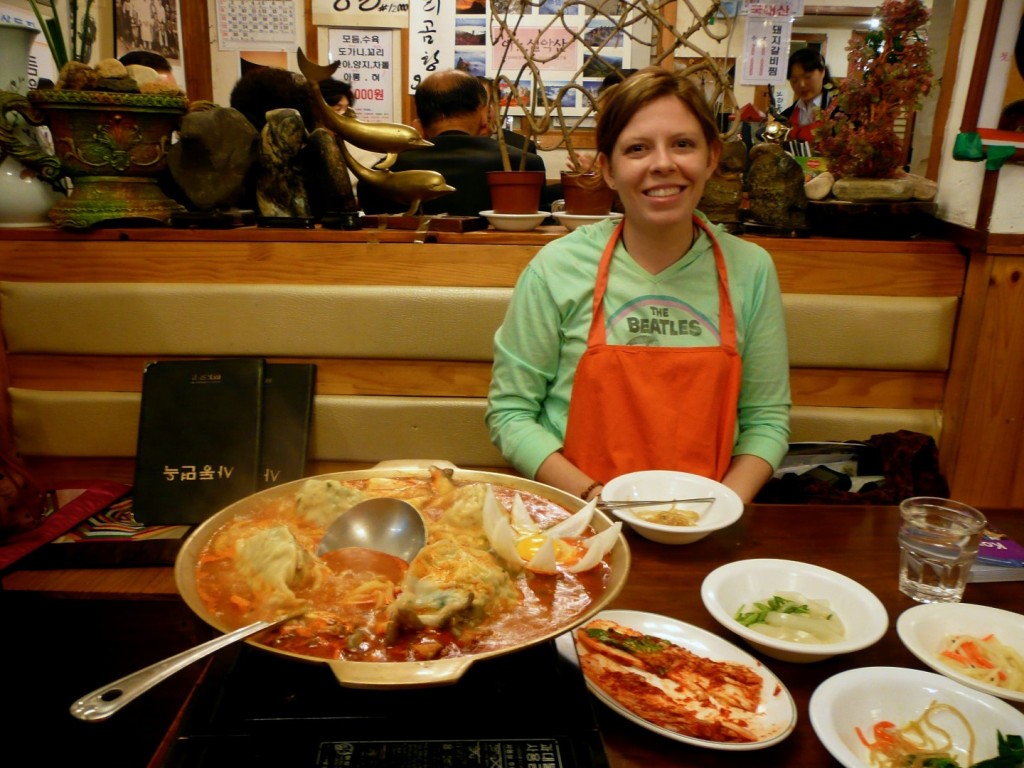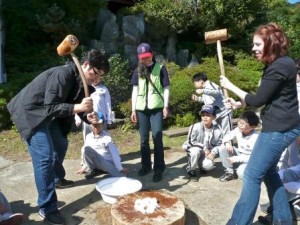 “Oh, you’re so lucky! What was it like? Aren’t you going to miss it there? Didn’t you love it??”
“Oh, you’re so lucky! What was it like? Aren’t you going to miss it there? Didn’t you love it??”
Where to begin… Usually, this sort of exchange is superficial enough that I say something like, “It was different. It was great. There are a lot of things I will miss.” Then that is the end of that. I mean, obviously no one wants to hear the truth of the matter: It’s complicated.
I was living in South Korea for over five years. It was never a dream of mine to travel to Korea, much less live there, but once I was presented with the possibility, it was almost intoxicating. The exotic allure of the East, a job waiting, plane tickets and housing provided, an adventure for the taking- Sign me up! In a matter of a couple of weeks, the idea of teaching ESL in Korea went from conception over rum on a volcanic island in Nicaragua to a signed employment contract being scanned and emailed from my mother’s home in Florida.
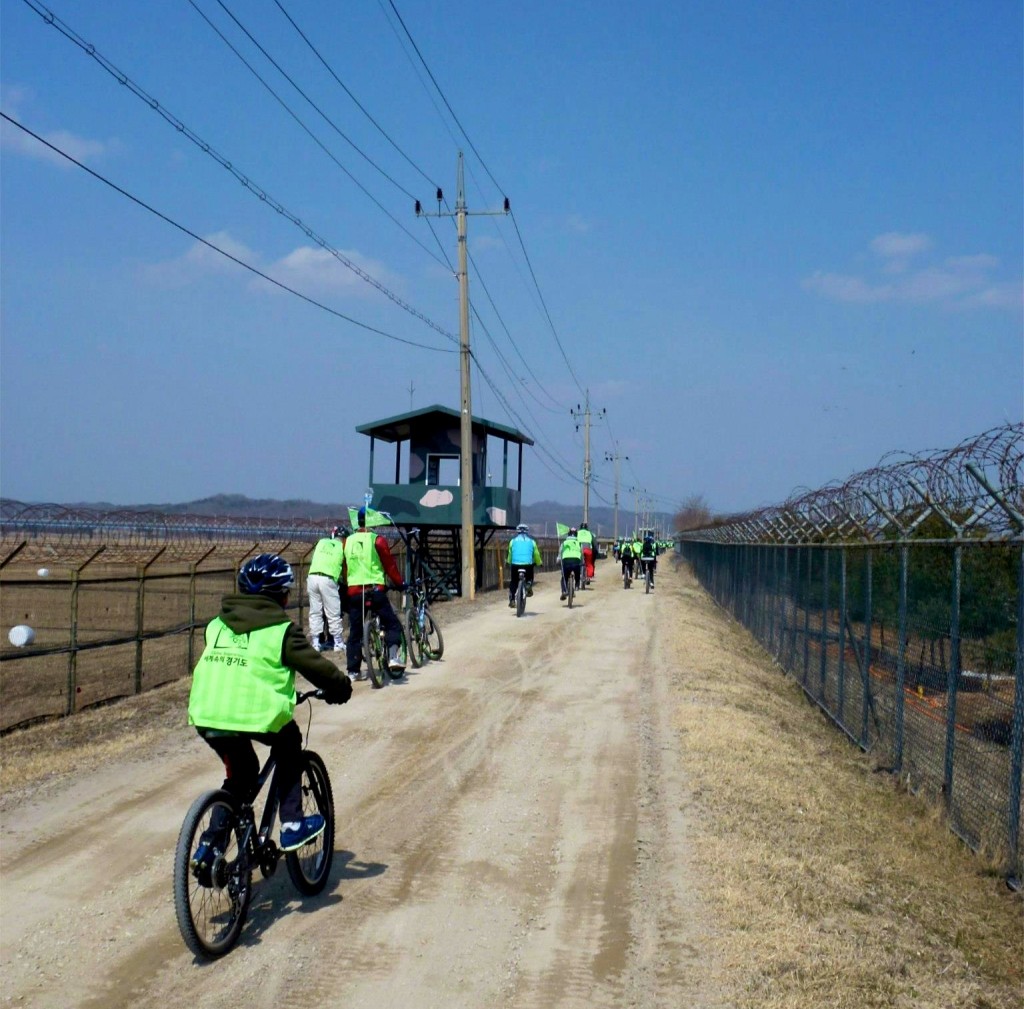
A short time after I sent in my contract, I was set up with an appointment at the South Korea Consulate in Atlanta and a travel itinerary. I landed in Seoul late at night, after over 24 hours of travel time. I was picked up by a stranger, the cousin of the director of my new school. We drove for an hour-and-a-half with K-Pop music blaring and only the most minimal of conversational exchange. I got the sense that his English skills were limited, but he said his aunt sent him because he was the only one in the family that spoke English well, though he did not work at the school. His aunt, my new boss, the Director of the English school I was now employed by, reportedly did not speak a word of English. (Need I mention that I did not speak a word of Korean at this point?) What on Earth was I in for?
Expectations vs. Reality
I was led to believe, by my recruiter, that life in Seoul would be grand and simple. I would be working for a reputable “school” (more on why I use quotations later), teaching elementary age children, and had even landed an “easy day schedule” teaching elementary students that made this position highly desirable. As for the location, Seoul was a wonderful and vibrant place to live, and it should be no trouble at all. “Everyone speaks English, and there are many foreigners there,” I was told.
Now is a good time to mention that, despite possible impressions, I was not naïve or untraveled at this point in my life. I knew I was getting lines from a recruiter about a number of things, but I was unconcerned. I had spoken with that fast friend of mine who had put the idea in my head initially, and our conversation had included details of her experiences. Nothing had stuck in my mind about the exchange other than the benefits available. (Perhaps I should thank the rum for manifesting rose-colored glasses?) So, at this point you may ask why I did not have a firmer grasp of the situation on the ground. – The timeline from concept to commitment had been short, yes, but this is the Internet Age, lady! – True enough. But I didn’t want to research this to death. I wanted a basic overview, so that this adventure could be full of surprise. I figured the basic expectations above would hold, despite the likelihood that this would not exclusively be a rainbows-and-unicorns experience. After all, I was about to immerse myself in an unfamiliar culture.
I soon discovered that most of what had been set as the basic expectations were not the reality. I did not work at a good school. My job was essentially a teaching position in name only. I did not encounter English-speaking Koreans on a regular basis while out in the world. Also, the vast majority of English-speaking foreigners are English teachers. What’s more, it turned out that Korea was glaringly lacking in diversity when compared to all other places I had been previously. Oh, and the culture shock was intense.
The Job
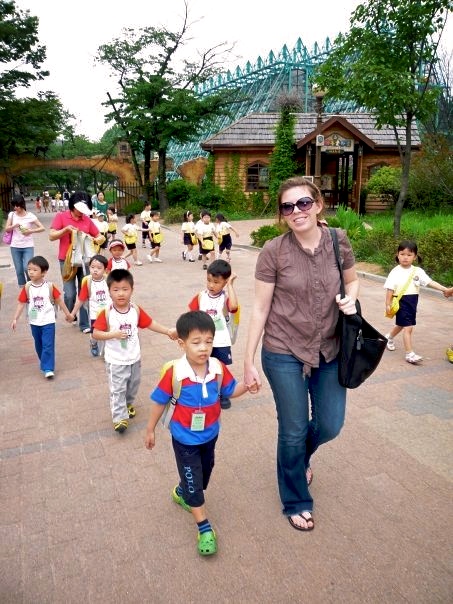
While much of the challenge of the day-to-day certainly was not unexpected, the job was much more troubling for me. For starters, the first day of work started less than 12 hours after I arrived in the country. The Assistant Director presented me with my class assignment and schedule, introduced me to my Korean co-teacher and the shared office full of other American English teachers and Korean teachers, then told me to clean my classroom before the students arrived at 9:30 (it was 9:15). My new co-teacher told me my assignment was very important, because I would be teaching the 5-year-old kindergartners, and they had the most involved and concerned mothers. At that point, the Korean teachers in the office all seemed to become busy within moments. They were talking rapidly on the phone or to each other in Korean, doing paperwork at the front desk, etc. Now, I was jet-lagged and not processing things as usual, and this all happened so quickly, so it wasn’t until moments after this whirlwind of activity that I was able to focus on what I had just been told. – Wait!! What?!? A kindergarten class? My students are five years old?? I was hired as an elementary-level teacher! This had to be a mistake…- I approached the Assistant Director, waited for her attention, and proceeded to explain that I thought there must be some mistake. Her previously friendly face became cold. She said that this was the position they had hired me for, that was my job, and I had better be good at it because they would be watching me very closely and I should be mindful of the cameras. Her face changed back to smiling and friendly, then she said not to worry, I would be teaching elementary students from 1:30 to 6:30 every day.
I returned to my new desk after that encounter. I must have looked just as dismayed as I felt, because a couple of the other foreign teachers came over to talk to me. They said they were not at all surprised that I had not known I would be teaching kindergarten, as many of them had also been surprised by that part upon arrival, but that our contracts were freely broken at the whim of management. We could be called to work later or on off days, the sick days were not real (I should consider them “dying days” for a more accurate interpretation), our “co-teachers” would not be joining us in the classroom, and our responsibility was to make the school and students look good, whether or not things were going well or children were learning English. There would be no real planning time, short breaks, and high stress. I now worked at a hagwon. This was a business. Keeping up the cash flow was the number one priority, so we had to get in line. Oh, and one more thing, had I heard of “Korean age?” because my kindergarten students would actually be 3- and 4-year-olds.*
* In Korea, your age is based on the year you were born, not your exact birth date. This is complicated by the fact that the gestation period is counted as one year, and the lunar calendar is followed. So, the day you are born, you emerge as a one-year-old. The first Lunar New Year that follows, you turn two, and everyone else also adds a year as if it is one massive birthday. Thus, on a child’s birthday, if you say, ”Happy birthday! How old are you now?” you will often be met with confused looks, as the two are not really related. – Because I have a December birthday, I am pretty much always two years older in Korean age. Bummer.
The quick rundown I got from my fellow foreign English teachers that day proved accurate. The children came in with no English skills, and the Korean “co-teachers” that were supposedly there to support us in our efforts were never in the room. There were shocking expectations of work placed on the students (mine were 3 and 4 and had required bookwork even though they could not hold pencils), and the foreign teachers were to blame if things did not appear to go perfectly. Fairly regularly, parents would call the school and complain to the Korean staff about the performance of the foreign teachers, who would then threaten us with the loss of our employment. The hours were long, our time was not our own, pay was not always on time, our health was not a priority, our classrooms were video monitored, and even our apartments were no sanctuary because anyone associated with the school could pop in whenever they saw fit. A few months in, I already knew I could not continue working in this sort of environment. Making it through even one year in Korea started to seem unlikely.
Life outside of work that first year wasn’t all bad, thankfully. There was a lot of bonding with coworkers and general exploration. We went out, saw the sights, attended festivals, ate and drank copious amounts. (Korean BBQ and soju – What a value!) I was learning so much about this culture, the language, the history that surrounded me. I even started dating someone I was crazy about. In many ways, I was quite happy with my decision and where I found myself. Too bad work was so painful.
Passing Time, Realizations, and Planning for an Exit
So, how the hell did it turn into nearly six years??? You guessed it. I got a much better job! I landed a position at a highly ranked English immersion school as a real elementary school teacher. The job came with about three months of paid vacation time each year, a higher salary, and the housing allowance (for private accommodations), severance pay, and all other perks that had initially brought me to Korea for a job. – Did I mention 3 months of paid vacation time?!?! (Just checking to make sure you were paying attention.) So, the difference in quality of life was huge. I was enabled to travel extensively at multiple points during each year, and I was able to grow professionally in my position.
Unfortunately, as the years passed, not even the change of job and the travel time could keep me happy. I knew with more and more certainty every day that Korea was not a forever home. I was not one with the culture, and felt I never could be. I was half a world away from friends and family. The friends I made in Korea were mostly transient, so goodbyes came too often. There was no real possibility of career growth in the long-term. The landscape was too devoid of wildlife, the food options left much to be desired, and the ever-looming threat of North Korea (innocuous as it seemed in the day-to-day) was a constant. Also, in a sense, the travel made it worse. I became aware of just how many places I preferred to Korea. Did it really make sense to keep growing roots in a place that I did not love? Not in the slightest.
After the realization that Korea would never be the home I wanted it to be, and I could never have the career I wanted there, I started making other plans. I was strategic about it all. I considered what I wanted in work and life. I also considered my finances and the trajectory of my current job. I committed to a 2-year plan that saw me through completion of another employment contract, a graduate program, and the building of a financial nest egg. It was all very well and good on paper, but in practice I did not do so well with “the plan.”
Hindsight
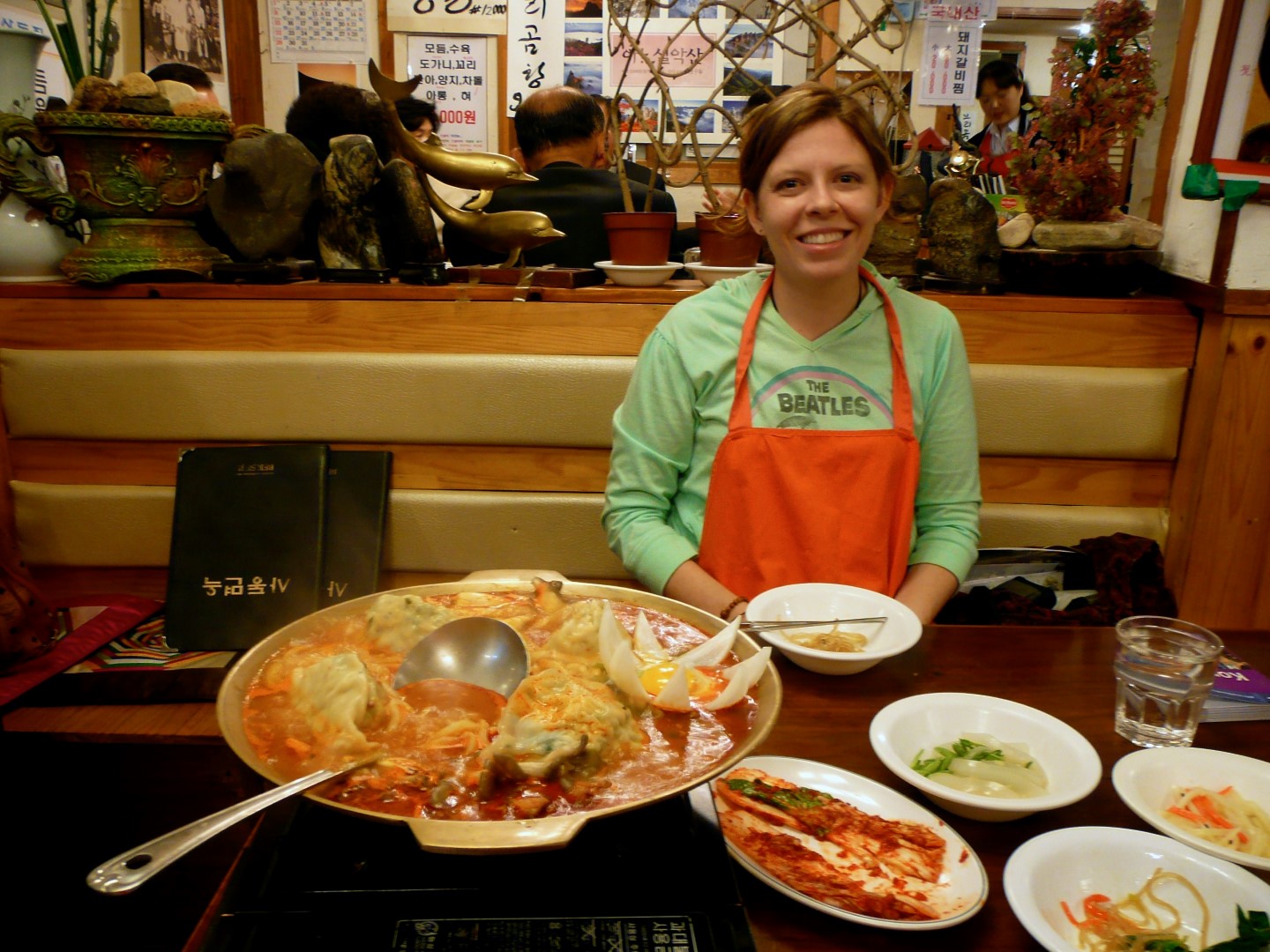
Looking back, I often wonder if my practical approach did more harm than good. Knowing I was not living where I wanted to be, and the factors that made it so being in my face on a daily basis, seemed only to compound my unhappiness as the time went on. I was increasingly aggravated by all of the little things that had been closer to annoying or mildly agitating. I did not care to go out much, because Seoul seemed at the same time to be too big and too small. I felt suffocated, pissed off, and basically like I was riding this roller coaster of emotion that all centered on the desire to escape from the land and the culture I was living within. I think I should have left before I got to such a point, but I was THRILLED when it was time to move away from Korea.
Now, Korea isn’t a horrible place, and my experience wasn’t all bad. In fact, I can recall much of what I experienced there fondly. I made some great friends, and I achieved some goals that would have been much more difficult in other situations. Most importantly, I got to know another culture and land, one that had been completely foreign to me and barely even considered before arrival, and I got to know it intimately. That is a powerful thing. I regard this experience as invaluable. I would not take it back. Living and working in Korea has shaped me in ways that I surely cannot even recognize fully at this point, and surely for the better. I am getting misty-eyed just thinking about how much it all meant to me.
So, once more:
“Oh, you’re so lucky! What was it like? Aren’t you going to miss it there? Didn’t you love it??”
To this, I want to say, without shame:
- I took an opportunity, and I am glad to have done so. I was not lucky, though. You can do it, too! You have to want it and look for it, but you can go out in the world if you are determined to do so.
- It was different, in more ways than I can properly detail. But it was also the same in many ways you notice after a while.
- No, I do not believe I will miss living there. I will miss some aspects. **
** Things to miss: the speed and availability of the Internet/cell service, street/market food, awesome public transportation, cheap taxis, low crime rates, shoe watching, “service” in stores and restaurants (random free gifts for patronizing a place), the lights on the bridges of Seoul, the friends that remain.
AND, to answer the most popular question: No, I did not love Korea.
At this point, let me say that I am NOT ashamed that I did not love Korea, because now I KNOW I do not love Korea. It made me realize what I value most, and what I require from my surroundings for long-term happiness. I am richer for this knowledge.
And so, in light of that, I LOVE that I lived in Korea, because it has enriched my life for years to come. With that, I say with all sincerity: THANK YOU, KOREA!
 About the Author: As the daughter of an anthropologist, Kendra Lewis began her cultural learning early on in life. Her enduring interest in other cultures and politics led her to study international relations and global affairs as an undergraduate in her home state of Florida. During those years, she was able to participate in two study abroad programs, studying Spanish language in Salamanca, Spain and international cooperation through the work of the United Nations in Geneva, Switzerland. A few years after completing her BA, Kendra took action on a long-delayed plan and moved to Nicaragua. Nicaragua led her to Korea, which she called home for over five years as she worked as a teacher in an English immersion school (and which allowed her to travel extensively). She has recently earned a Master of Education degree in International Education and returned to the United States to pursue a career as an international education professional. She hopes her future work will focus on internationalization initiatives, intercultural education, or education abroad programming in a higher education context. You can reach out to Kendra via LinkedIn.
About the Author: As the daughter of an anthropologist, Kendra Lewis began her cultural learning early on in life. Her enduring interest in other cultures and politics led her to study international relations and global affairs as an undergraduate in her home state of Florida. During those years, she was able to participate in two study abroad programs, studying Spanish language in Salamanca, Spain and international cooperation through the work of the United Nations in Geneva, Switzerland. A few years after completing her BA, Kendra took action on a long-delayed plan and moved to Nicaragua. Nicaragua led her to Korea, which she called home for over five years as she worked as a teacher in an English immersion school (and which allowed her to travel extensively). She has recently earned a Master of Education degree in International Education and returned to the United States to pursue a career as an international education professional. She hopes her future work will focus on internationalization initiatives, intercultural education, or education abroad programming in a higher education context. You can reach out to Kendra via LinkedIn.

